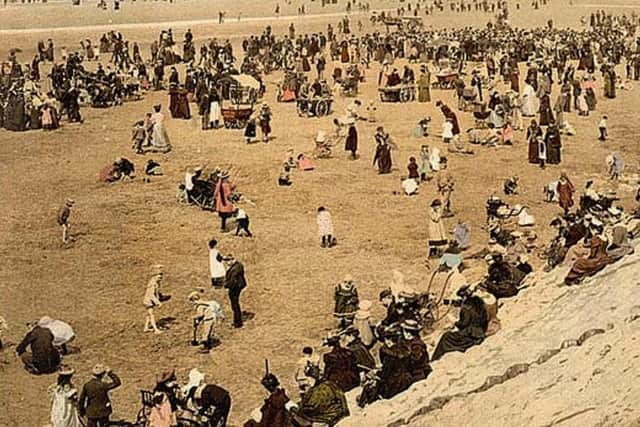Lost cheque found on Blackpool beach lands a Preston couple in hot water
and live on Freeview channel 276
On the third Tuesday of August 1857 Mrs. F.G. Crossley of Leeds was on holiday in Blackpool and went for a walk on the sands.
During her walk she lost her purse which contained £4 in gold and a cheque for £50 – equal to £6,300 in today’s money - from the Leeds Banking Company. Desperate to recover it she employed a bellmen to walk the sands announcing her loss, but unfortunately it was a fruitless exercise.
Advertisement
Hide AdAdvertisement
Hide AdAlso in Blackpool that day were stonemason Thomas Whittle and his wife Ellen, a Preston couple who would find themselves exactly a year later before the magistrates at the Preston Police Court in early August 1858, along with local builder William Haysworth of Black Horse yard. They were all accused of forging an endorsement on the lost cheque with intent to defraud.


After a lengthy hearing all three were committed to the forthcoming Liverpool Assizes with the magistrates seeing fit to bail Haysworth having doubts over his involvement, the Whittles being remanded in custody.
Proceedings took place before Lord Chief Justice Baron Pollock with all three pleading not guilty. The court heard that the Whittles’ had been in Blackpool on the day in question, and were seen in possession of the cheque, on the faith of which they borrowed several small sums of money.
Witnesses testified that the cheque had been presented at a bank in Leeds in early July 1858; but in the absence of Mrs. Crossley’s endorsement payment was refused.
Advertisement
Hide AdAdvertisement
Hide AdPreviously Ellen Whittle had shown the cheque to several people, stating in what manner she became possessed of it, including neighbour James Rigby of Brookfield Street, Preston who she told of her find on Blackpool sands. A couple of weeks later, an endorsement was put upon the cheque, and signed as ‘F.G. Crossley’.
According to the prosecution Haysworth was present when the endorsement was made and a cashier at the Leeds Banking Company deposed that Haysworth had presented the cheque for payment days later. The cashier being suspicious sent for a police officer who took Haysworth into custody.
Under cross examination the cashier agreed that Haysworth had presented his business card at the bank. Which according to his defence counsel Richard Assheton Cross QC, a Preston MP at the time, was a sign of his honesty regarding the transaction.
William Proctor was called by the prosecution and he testified that the Whittles’ had induced him to advance money upon the cheque, with Ellen Whittle telling him her maiden name was Crossley and it was a legacy from an aunt.
Advertisement
Hide AdAdvertisement
Hide AdAfter several witnesses had been called for the prosecution, Mr. Cross dwelt strongly on the bank visit by his client. Saying Haysworth would hardly have gone to that bank knowing he was trying to pass a forged document, and that he only agreed to cash the cheque after pressure from Proctor who was a business associate and had lent the couple money.
His Lordship in his summing up took the same view of the evidence as the defence counsel. The jury, after a few minutes consideration, acquitted Haysworth and found the Whittles’ guilty as charged. Haysworth was at once set at liberty and addressing the guilty pair His Lordship sentenced them both to four years penal servitude.
Comment Guidelines
National World encourages reader discussion on our stories. User feedback, insights and back-and-forth exchanges add a rich layer of context to reporting. Please review our Community Guidelines before commenting.